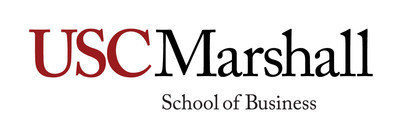Evolution, Revolution, and Disruption at the Global Supply Chain Excellence Summit
USC Marshall Hosts Seventh Annual Discussion of Policy, Industry Leadership, and Research
LOS ANGELES, Aug. 13, 2019 /PRNewswire/ -- The University of Southern California's Marshall School of Business hosted the seventh-annual Global Supply Chain Excellence Summit Thursday, Aug. 8 and Friday, Aug. 9.
Sponsored by USC Marshall's Center for Global Supply Chain Management (https://www.marshall.usc.edu/faculty-research/centers-excellence/center-global-supply-chain-management), the event offered perspectives on critical issues throughout the supply chain eco-system: ports, food supply chain, retail, finance, sustainability, and humanitarian issues.
"The global supply chain continues to undergo evolution, revolution, and disruption simultaneously across different markets and geographies," said Nick Vyas, Founding Executive Director and Academic Director of the USC Marshall Center for Global Supply Chain Management. "Through the Summit and in striving for global supply chain excellence, Marshall seeks each year to connect leaders and create transformation in this essential part of the global economy."
To help answer the demands of global supply chain leaders, this year's Summit featured Container 42 (https://weare42.io/), the result of a partnership with Esri, Cisco, IBM and the Port of Rotterdam to deliver a platform for innovation, research and solutions for stakeholders in shipping, ports and related transportation channels. It is meant to answer questions about the future of technology, sustainability and logistical efficiency to address the increasingly global supply chain demands across the globe.
Details on the keynote speakers listed below are available here: https://globalsummit.uscsupplychain.com/speakers2019/.
Keynote presentations were given by the following featured speakers:
- Sarah K. Matthews, Americas Supply Chain Intelligence Leader, EY (https://www.ey.com/en_gl)
- Lloyd E. Wood, III, Deputy Assistant Secretary for Textiles, Consumer Goods, and Materials, U.S. Department of Commerce (https://www.commerce.gov/)
- Hans Melotte, Executive Vice President, Supply Chain, Starbucks (https://www.starbucks.com/)
- Geoff Brady, Head of Global Trade & Supply Chain Finance, Bank of America (https://www.bankofamerica.com/)
- Erwin Rademaker, Program Manager, Port of Rotterdam (https://www.portofrotterdam.com/en)
- Nick Vyas, Global Supply Chain Outlook 2025, USC Marshall (https://www.marshall.usc.edu/)
- Andre Simha, CIO, MSC (https://www.msc.com/usa?lang=en-gb)
- Gene Seroka, Executive Director, Port of Los Angeles (https://www.portoflosangeles.org/)
- Noel Hacegaba, Managing Director Commercial Operations & Chief Commercial Officer, Port of Long Beach (http://www.polb.com/)
Additionally, a Blockchain panel chaired by Nick Vyas featured industry experts and researchers, including:
- Alison E. Clafin, Director of Business Development, Maersk TradeLens (https://www.tradelens.com/)
- Kimon Drakopoulos, Assistant Professor of Data Science and Operations, USC Marshall
- Ann McCormick, Director – Trade and Supply Chain, Bank of America
- Deep Ghumman, Advisory Services Principal, EY
- Aljosja Beije, Logistics and Supply Chain Lead, Blocklab Rotterdam (http://www.blocklab.nl/)
- Bhaskar Krishnamachari, Director, USC Viterbi Center for Physical and Cyber Systems (https://cci.usc.edu/)
The Center for Global Supply Chain Management also introduced three new initiatives for the upcoming academic year and beyond at this year's Summit:
- Institute for Blockchain in Supply Chain (iBISC)
- The iBISC initiative (https://uscsupplychain.com/ibisc/) will pursue the following:
- Research areas of use and practical implementation of blockchain technology in supply chain operations and logistics, led by a team of post doctorate researchers
- Aim to create a consortium of companies and SMEs to lead the direction of projects
- Create guidelines and adoption options from concept to last-mile applications in industries to facilitate:
- Transparency
- Integration
- Cooperation
- Security & Accountability
- Supply Chain Without Borders
- Supply Chain Without Borders (SCPWoB) is an online platform that connects supply chain professionals with organizations that service low income areas with various humanitarian needs. The purpose of the platform would be to help alleviate issues for these organizations through education, resources, consulting, and funding.
- Gift of Knowledge
- A full scholarship, with living stipend, to attend the Master Program in Global Supply Chain Management (MSGSCM) at USC's Marshall School of Business in Los Angeles, CA. Graduating from USC Marshall Business with a degree in MSGSCM will help to:
- Develop the necessary human capital to run health care supply chain effectively and efficiently reducing suffering and mortality.
- Provide participants a unique experience and the skills that come from training with the faculty and expert supply chain advisors, something that cannot be replicated any other way.
- These graduates will be able to teach and train people in their own countries ensuring a sustainable solution developing the necessary expertise while reducing the human capital gap.
- Consideration will be given to the most qualified students from low and middle-income countries who are unable to pay the tuition at USC.
Finally, awards were given to companies and individuals in the following categories:
Contact: Matthew Simmons
USC Marshall Media Relations
Email: matthew.simmons@marshall.usc.edu
Phone: 213-821-9868
SOURCE USC Marshall School of Business




